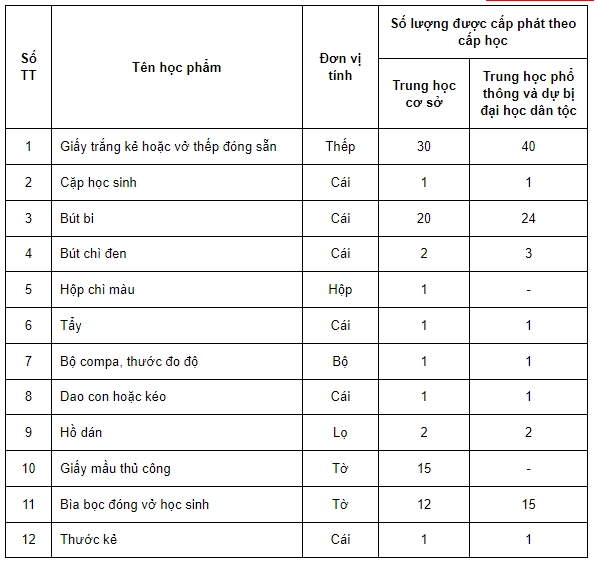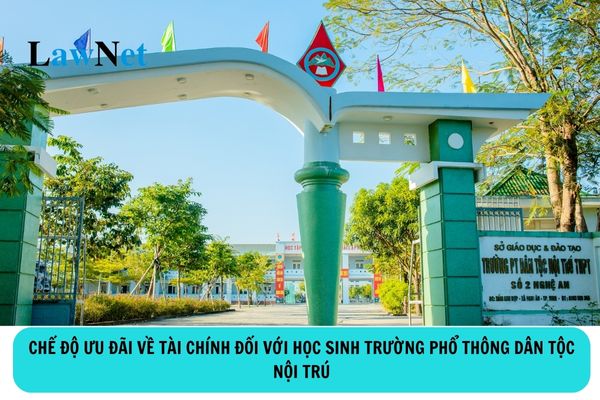What are the incentives for students of ethnic minority boarding schools in Vietnam?
What are the incentives for students of ethnic minority boarding schools in Vietnam?
According to the provisions of Article 2 of the Joint Circular 109/2009/TTLT/BTC-BGDDT, the incentives for students of ethnic minority boarding schools are as follows:
(1). Tuitions: exempt from tuitions.
(2). Scholarships:
- Students studying at ethnic minority boarding schools under the Ministry of Education and Training, provinces, and districts are entitled to policy scholarships equal to 80% of the State's minimum wage and are entitled to receive scholarships for 12 months a year. For training programs lasting less than one year or with a final school year of fewer than 12 months, scholarships are provided according to the actual months of study that year.
- Students disciplined to drop out will not receive policy scholarships.
- Students suspended from studying will not receive scholarships during the suspension period, except in cases of suspension due to illness, accidents, repeating classes, or other reasons (not due to discipline or voluntary dropout).
- Students who fail to advance to the next class (repeat a year) in the repeating year only enjoy half the scholarship. If they still do not meet academic requirements by the third year, they will be sent back to their localities. Each student is allowed to repeat a year only once per educational level.
- Students of ethnic minority boarding schools eligible for policy scholarships, who are also recipients of social allowances or preferential allowances, will still receive these social and preferential allowances.
(3). Rewards:
Students with good academic and training results (in the previous school year) are rewarded once a year by the school as follows:
- VND 400,000 for good results;
- VND 600,000 for excellent results;
- VND 800,000 for outstanding results.
(4). Provision of in-kind supplies:
Upon admission, students receive in-kind supplies once from the school, including some personal items as follows:
- Personal quilt;
- Personal mosquito net;
- Cotton jacket;
- Personal mat;
- Raincoat;
- Long-sleeved clothes (uniform).
(5). Travel expenses: Students receive travel expenses based on the normal fare of public transport once a year (for both departure and return) to visit family during Tet or summer holidays.
(6). Learning supplies support: Students receive in-kind learning supplies annually based on the standards of each educational level as follows:

(7). Textbooks: The school builds a shared textbook library to lend each student a set corresponding to their class level. The school is responsible for organizing the borrowing and maintenance of textbooks for long-term use and effectiveness; annually, the school is allowed to supplement up to 10% of the shared textbook collection.
(8). Expenditures for Lunar New Year and ethnic festivals:
The school can organize two events a year for students who stay at school during the Lunar New Year and traditional ethnic festivals, with an expenditure of VND 50,000 per student per stay.
(9). Cultural and sports activities:
- Each class receives:
+ One local newspaper;
+ One youth newspaper or "Education and Times" newspaper or literary magazine for ethnic groups serving the school's special education activities.
- Expenditures for recreational activities: cultural, artistic, sports activities, and mass advocacy activities of the school (budget within 5% of the students' scholarship fund).
(10). Health protection expenditures:
- Expenditures for health examination books and annual health check-ups for students.
- Expenditures for purchasing health insurance and common medications for the school's medicine cabinet.
(11). Expenditures for admission and graduation exams:
Admission, testing, promotion, graduation, and school transfers are carried out according to the current regulations of the Ministry of Education and Training. The school can budget for expenditures such as:
- Preparing admission, successful candidate, and graduation records according to current regulations.
- Issuing student cards and personal insignia.
(12). Expenditures for electricity and water for learning and activities:
The school budgets for electricity and water for students' learning and activities as follows:
- Lighting electricity: average of 25KW/month/student according to local electricity prices.
- Living water: average of 4m³ water/month/student according to local prices.
In areas where services for electricity and water supply are unavailable or where natural disasters cause power outages, the school can purchase fuel for lighting, install water systems, or dig wells. No individual financial aid for electricity or water is provided.
(13). Collective dining expenditures: Annually, the school can purchase new or repair collective dining tools at a cost of VND 50,000 per student per year.
(14). Other regulations:
- Students who are not allowed to continue studying at the school due to failure in graduation, discipline leading to expulsion, or long-term illness, comply with current regulations of the Ministry of Education and Training and will no longer receive the financial assistance specified in Joint Circular 109/2009/TTLT/BTC-BGDDT.
- Students detained during an investigation will not receive scholarships during detention.
- Students taking leave for medical treatment will still receive scholarships, but not for more than three months. If students are sent back home, travel expenses will be covered, including for an accompanying caretaker.

What are the incentives for students of ethnic minority boarding schools in Vietnam? (Image from the Internet)
Who are the eligible for admission to ethnic minority boarding schools in Vietnam?
According to Article 9 of the Regulations on Organization and Operation of Ethnic Minority Boarding Schools issued with Circular 04/2023/TT-BGDDT, eligible candidates for admission to ethnic minority boarding schools include:
- Students from ethnic minorities where both the student and either parent or guardian have had continuous residence for at least 36 months as of the date of admission application in:
+ Communes, wards, and commune-level towns in regions classified as Zone 3 and in especially difficult villages in ethnic minority and mountainous regions, and especially difficult communes in coastal and island areas as per authority regulations;
+ Communes, wards, and commune-level towns classified as Zone 2 and Zone 1 in ethnic minority and mountainous regions as per authority regulations.
- Students from very small ethnic groups as defined in Decree 57/2017/ND-CP.
- Students from the Kinh ethnic group where both the student and either parent or guardian have had continuous residence for at least 36 months as of the date of admission application in especially difficult communes or villages. Ethnic minority boarding schools may admit no more than 10% of Kinh ethnic students in the total annual new admission quota.
* If the number of eligible candidates as defined in (1), (2), (3) is less than the ethnic minority boarding school's capacity on the local level, the provincial People's Committee may stipulate additional regions for recruiting more ethnic minority students from poor or near-poor households, where both the student and either parent or guardian have had continuous residence for at least 36 months until the admission application submission date.
What are the conditions for applying to ethnic minority boarding schools in Vietnam?
According to Clause 1, Article 10 of the Regulations on Organization and Operation of Ethnic Minority Boarding Schools issued with Circular 04/2023/TT-BGDDT, the conditions for applying to ethnic minority boarding schools are as follows:
- Must belong to the eligible candidate group;
- Must comply with the regulations of the junior high school and high school admission regulations issued by the Ministry of Education and Training.

